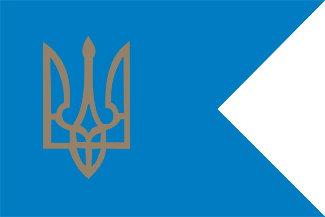 image
by Jaume Ollé, 31 August 2001
image
by Jaume Ollé, 31 August 2001
Last modified: 2023-01-28 by martin karner
Keywords: ukraine | hetman |
Links: FOTW homepage |
search |
disclaimer and copyright |
write us |
mirrors
See also:
All these flags are constructed according to specifications
from Lucien Philippe. I will comment about the differences with
the ones from Montells/Romanischin.
Jaume Ollé, 31 August 2001
Generically speaking, a Hetmanate was a Cossack realm under the authority of
a Hetman, who was the head of state, commander in chief of the Cossack army, and
head of the entire administrative, judicial, and military apparatus (see www.uanews.tv).
However, in post-WWI terms it was a German-backed Ukrainian state, according to www.buckyogi.addr.com:
"The Ukraine declared itself autonomous in November of 1917,
and declared its independence in January of 1918 after invasion
by the Red Army. The UNR [Ukrainian National Republic] was
unstable, and had great difficulty in maintaining the territory
it claimed against intrusion by Bolshevik, White Russian, and
Cossack factions. Its problems were magnified when a
German-backed government called the Hetmanate claimed control of
the Ukraine in April, 1918. The population's disgust with this
continued chaos led to the uprising of the anarchist Greens. The
UNR managed to finally suppress the Hetmanate in December of
1918, and annexed West Ukraine the following month, triggering
war with the new state of Poland, which pushed back Ukrainian
forces and annexed the region in June of 1919. These continuing
pressures forced the collapse of the UNR, which fell to Bolshevik
forces in the summer of 1920."
The term Hetman might derive from German "Hauptmann" or (field) captain (*not*
general), at least that is what www.geocities.com/unavy/aUNRnavy.html
-which also contains some flag-related information (in a
questionable English...) says:
"Ukrainian Navy during Hetmanate 1918 - Remarkably 29th of
April was also the day when a coup-d'etat occurred against UNR and
Hetmanate (Monarchy) was proclaimed. Hetmanate was the term used
by the Cossacks meaning generalship (hetman - haupt man in Ger. -
general). Pavlo Skoropadsky was proclaimed to be the hetman and
with the support of the German Armies as his allies became the
ruller of Ukraine. This caused the "Hit Corps" to be
recalled from Crimea, which was overrun by the German
troops. With communications lost with Kiev, vice-admiral
Sablin with some ships retrieved to Novorossijsk, while other
ships had changed their flags again to fly the Imperial Kaisers
banner. Only after the communications were re-established, the
navy was handed over to the Hetman. During the reign of hetman
Skoropadsky a lot was done for navy. The newly established
Ministry of Naval Affairs developed a series of laws regulating
the uniform, ranks, flags and other symbols. At the same time
officers manuals were being translated into Ukrainian and other
instructions. For the first time since Ukrainian Independence
names of the ships were changed from Russian to Ukrainian.
Towards November 1918, Hetmanate also received Mozyrsk (Pinks)
flotilla which also used to be in the hands of the Germans.
Because of German losses in the war, they began to withdraw from
Crimea and their place was soon replaced by the ships of Antate.
Since Hetman Ukraine was supporter of the Triple Alliance, the
Antante considered them as possible enemies they occupied the
ships and started to divide them among themselves as war
trophies and transferred some of the ships to Istanbul."
Santiago Dotor, 12 May 2003
 image
by Jaume Ollé, 31 August 2001
image
by Jaume Ollé, 31 August 2001
Standard of the hetman of Don and Kuban (in use May 1918),
Swallow tail. According Lucien Philippe the trident don't have a
cross. (I believe that the flag was without cross before May and
it was added in May 1918)
Jaume Ollé, 25 August 2001
Standard of the Hetman of Ukraine, Don Host and Kuban Host.
The single difference with Montells is that he said that the
trident is black. (and he picture it black) but I believe that he
was wrong at least here.
Jaume Ollé, 31 August 2001
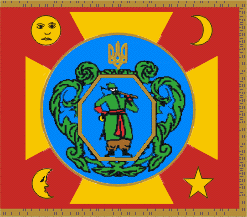 image
by Jaume Ollé, 31 August 2001
image
by Jaume Ollé, 31 August 2001
Hetman personal standard (as hetman, not as a state head).
Jaume Ollé, 25 August 2001
The image posted before (from Montells) is a simplification of
the true design according to Philippe. The flag (always according
Philippe) was 16:19 with the design pictured in my Gif but within
a light blue disk gold bordered. In background of the disk are
the arms of a yellow cross paté (like Wallis) and in each corner
of the cross: 1) sun with eyes etc..., 2) half moon (points to
the fly), 3) half moon with face and 4) five pointed star (the
four devices in yellow). The background color is dark red
(crimson).
Jaume Ollé, 31 August 2001
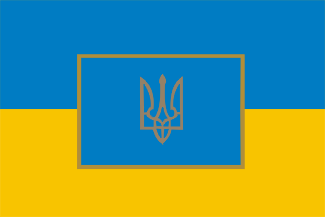 image
by Jaume Ollé, 31 August 2001
image
by Jaume Ollé, 31 August 2001
Blue over yellow. In the center a blue rectangle bordered gold
containing the trident (Gold and without the cross).
Jaume Ollé, 25 August 2001
This one not pictured neither quoted by Montells.
Jaume Ollé, 31 August 2001
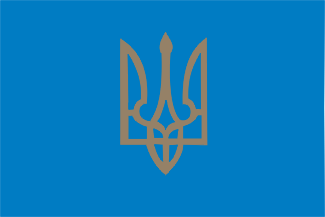 image
by Jaume Ollé, 31 August 2001
image
by Jaume Ollé, 31 August 2001
Both have equal picture.
Jaume Ollé, 31 August 2001
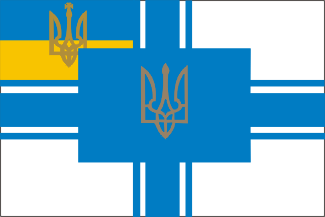 image
by Jaume Ollé, 31 August 2001
image
by Jaume Ollé, 31 August 2001
Montells only say that Hetman also utilized this standard.
Philippe said that it is the standard of the hetman as Admiral of
the fleet. Montells give the tridents black and Philippe say
golden. The canton trident in Philippe has cross and the one from
montells doesn't have.
Jaume Ollé, 31 August 2001
 image
by Jaume Ollé, 31 August 2001
image
by Jaume Ollé, 31 August 2001
Hetmans representatives in Crimea, Kuban and Orient, personal
standard. Montells attributed this flag to the Hetman in this
territories. Fimbriation according Montells is blue-yellow and
according Philippe blue-white. same differences in trident in
canton (without cross in Montells) and color (both trident black
in Montells)
Jaume Ollé, 31 August 2001
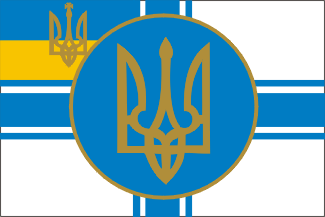 image
by Jaume Ollé, 31 August 2001
image
by Jaume Ollé, 31 August 2001
Standard of the male members of the hetman family who have
title of Admiral general (not quoted neither pictured by
Montells).
Jaume Ollé, 31 August 2001
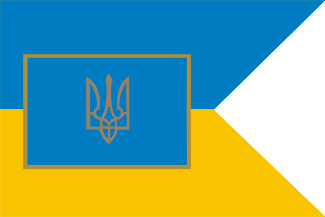 image
by Jaume Ollé, 31 August 2001
image
by Jaume Ollé, 31 August 2001
Hetman's Wife (not quoted neither pictured by Montells).
Jaume Ollé, 31 August 2001
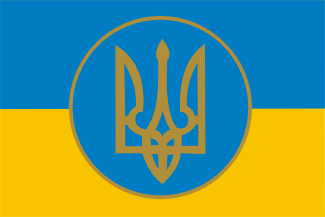 image
by Jaume Ollé, 31 August 2001
image
by Jaume Ollé, 31 August 2001
Princes of the Hetman's family (not quoted neither
pictured by Montells).
Jaume Ollé, 31 August 2001
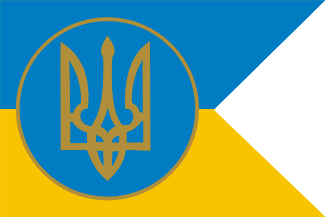 image
by Jaume Ollé, 31 August 2001
image
by Jaume Ollé, 31 August 2001
Princess of the hetman's family (not quoted neither
pictured by Montells).
Jaume Ollé, 31 August 2001